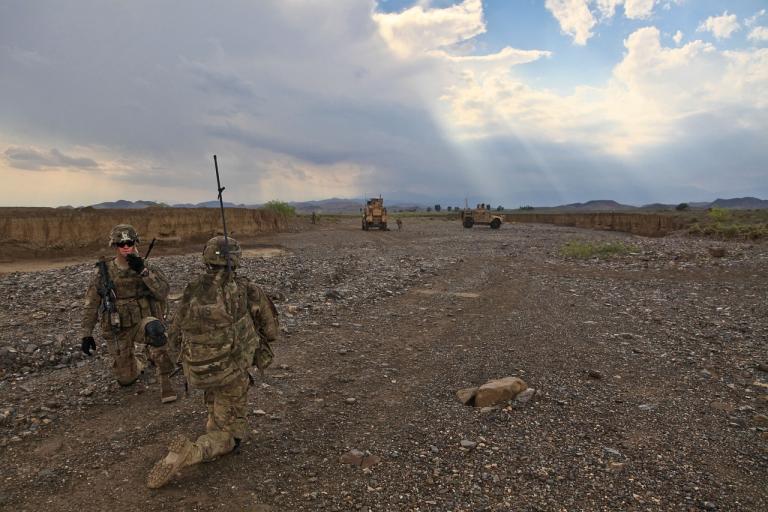
At the close of this post, I will raise several questions. Among them is, “Could it be that the US’ “endless wars” of the past several decades have not been about our national security as much as they have been about furthering the objectives of the military-industrial complex?
The victors write history
This might be an obvious statement, but I suspect that most people don’t consider this. My experience is that most Americans think of history as history. What we were taught in school is what happened. Sure, we may not have heard everything. There might be stories that were left out of our education—after all, you can’t say everything. The Gospel of John even says this,
“Therefore many other signs Jesus also performed in the presence of the disciples, which are not written in this book” (John 20:30)
“And there are also many other things which Jesus did, which if they were written in detail, I suppose that even the world itself would not contain the books that would be written” (John 21:25).
History tells us, however, that if we care to look carefully (and let’s be honest, most of us don’t care to look carefully), this is not true.
Think, for example, of what the people of Afghanistan are told about the history of the US-Afghan war. Or what the history of the Korean War is like from the perspective of N. Korea.
Now, these examples are okay, but I suspect that many Americans might conclude that the people of Afghanistan and N Korea simply do not know the truth about those wars. In the US, however, we are told the truth.
The book of Revelation and Propaganda
The book of Revelation suggests that things are more complex. As I argue in my commentary, the book of Revelation tells a story—a magnificent story at that. In this story, God (the Father), the One who sits on the Throne, is the world’s true king. Caesar is not (we need to substitute “empire,” “Rome,” “Germany, the “US,” and any and all nations—i.e., the kingdoms of the world—in for “Caesar”).
Revelation then proceeds to declare that the nations of the world maintain their power by using violence and oppression. But they also use deception (or what may better be termed “propaganda”).
For the book of Revelation, deception is, in part, the role of Beast #2 (aka “The False Prophet”). One of the primary roles of the False Prophet is “And he makes the earth and those who dwell in it to worship the first beast” (Rev 13:12).
The False Prophet works alongside Beast #1 (which I prefer to designate as “empire” as long as we recognize that all nations are to some extent “empires.”—I do believe that Beast #1 is more than empire, but we will leave it at that for now).
In other words, we worship (perhaps a better way to say it is that we “give allegiance”) to the Beast (empire) because we have been deceived into doing so (mind you, there are degrees of deception, but at the end of the day, allegiance to empire is to some extent a result of deception). Or, perhaps we might say we have come to believe the propaganda.
Some may feel uneasy about this, and I dare say that is part of the problem.
It may seem as though I am being a bit extreme, so allow me to clarify a few things: Namely, I am not saying that all empires are evil, nor am I saying that everything they say is a lie (or propaganda).
Empires (like all nations) seek their own interests. They also want their citizens to believe that what they are doing is right and for the good of the people. But ultimately, they act in accordance with the interests of the empire. Their central goal is to maintain or increase their power and wealth. And propaganda is a central means by which they garner support among the people.
Noam Chomsky’s Manufacturing Consent
In Noam Chomsky’s classic work Manufacturing Consent, he describes the media’s role as one that furthers the empire’s agenda.
We may all want to believe the media (at least the Western media, where we have the right to free speech and the freedom of the press—there is a lot more to say here, but I will bite my tongue for now) is independent and relatively unbiased.
Our freedom of the press clearly contrasts Russia and China, where dissidents are regularly locked up.
NB: Amnesty International reports that just three weeks ago, Aleksei Sokolov, a human rights defender, was arrested in Russia for a Facebook post that displayed an “extremist” logo. Sokolov has been an outspoken defender of prisoner rights and against the use of torture in Russian prisons.
Chomsky notes,
“In countries where the levers of power are in the hands of a state bureaucracy, the monopolistic control over the media, often supplemented by official censorship, makes it clear that the media serve the ends of a dominant elite (88).
Chomsky, however, contends that the US media also serves to advance the agenda of the state: He contends,
“It is our view that, among their other functions, the media serve, and propagandize on behalf of, the powerful societal interests that control and finance them” (8).
Chomsky doesn’t deny that some within the media may dissent. Nonetheless, he notes, “The beauty of the system, however, is that such dissent and inconvenient information are kept within bounds and at the margins so that while their presence shows that the system is not monolithic, they are not large enough to interfere unduly with the domination of the official agenda” (9).
Chomsky adds,
“Our belief [about the media], based on many years of study of the workings of the media, [is] that they serve to mobilize support for the special interests that dominate the state and private activity . . . and that their choices, emphases, and omissions can often be understood best, and sometimes with striking clarity and insight, by analyzing them in such terms.” (81)
Chomsky notes that this is not what we generally think about the media,
“The democratic postulate is that the media are independent and committed to discovering and reporting the truth and that they do not merely reflect the world as powerful groups wish it to be perceived.”
To some extent, we know that the media is not wholly independent. Even if a journalist believes they are writing the truth, and I assume that most journalists are conscientious and desire to print what they believe is true, we know that, at the end of the day, the media outlets are owned by major corporations whose interests they must support and cater to. We all know intuitively that advertising dollars play in huge role in controlling the media.
“Since 1990, a wave of massive deals and rapid globalization have left the media industries further centralized in nine transnational conglomerates—Disney, AOL Time Warner, Viacom (owner of CBS), News Corporation, Bertelsmann, General Electric (owner of NBC), Sony, AT&T-Liberty Media, and Vivendi Universal. These giants own all the world’s major film studios, TV networks, and music companies, and a sizable fraction of the most important cable channels, cable systems, magazines, major-market TV stations, and book publishers” (11).
NB: I don’t know what Chomsky would say about the rise of independent, non-mainstream journalism and the rise of YouTube. His book was published in 1988 and updated in 2002. Nonetheless, let’s listen carefully to what Chomsky says:
The modern media “is a guided market system that we describe here, with the guidance provided by the government, the leaders of the corporate community, the top media owners and executives, and the assorted individuals and groups who are assigned or allowed to take constructive initiatives” (82).
Chomsky’s thesis may seem alarmist. However, he is not some random theorist whose ideas may be dismissed. As a former professor at MIT, he has spent more than half a century writing and teaching linguistics and social criticism. He is one of the founders of the field of cognitive science and is widely recognized as the father of modern linguistics.
In Manufacturing Consent, Chomsky spends 600 pages detailing instances in which the media has unwittingly advanced the narrative that the state feeds them.
Could we, too, have been duped by propaganda?
My answer is, “unquestionably.” And if Chomsky is correct, it is worse than we might imagine. This will be the subject of my next post. But before I close, let me note why I think this matters.
Is it possible that we have come to believe things about the world and our nation in particular when, if we had the proper information, we might have reached radically difficult conclusions? Is it possible that our country’s ambitions are not as noble as we have been led to believe?
Could it be that the US’ “endless wars” of the past several decades have not been about our national security as much as they have been about furthering the objectives of the military-industrial complex?
Could it be that our elected officials, knowing that they are beholden to these very powerful corporations, have fed the media what they want them to know and withheld information that they do not want the media to know to facilitate the narrative that said wars are necessary and just when in reality, they are primarily lining the pockets of the executives and the investors?
This is precisely what the book of Revelation indicates. Thus, Revelation’s cry is, “Come out of her, My people” (Rev 18:4).
. . . to be continued.
Our goal is to keep these posts free of charge. I do not intend ever to hide them behind a paywall. I can only do this if those of you who have been blessed by them and can afford to give ($5, $10, $25, or more/month) do so. You can give a tax-deductible contribution by following this link.
Please share this post and let others know about determinetruth
If you wish to view this blog on your smartphone through the Determinetruth app download the “tithe.ly church” app and insert “determinetruth” as the church name you wish to follow. Once it is loaded, click on the “blog” icon and it will automatically load.
If you would like to have Rob speak at your church or organization in person or via Zoom, please let us know by filling out the contact info on the Contact me tab on this site















